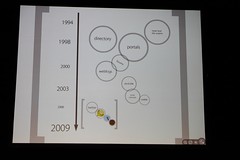Le Web 2009, Day 2: The good, the bad and the vacuous
by Matthew Buckland on December 10, 2009 at 8:44 am
 For day two of Le Web, this Travelling Geek slinked off to one of the side rooms for the “deep discussion” sessions. There was the word “future” in quite a few of the session titles, which caught my attention.
For day two of Le Web, this Travelling Geek slinked off to one of the side rooms for the “deep discussion” sessions. There was the word “future” in quite a few of the session titles, which caught my attention.
 |
 |
 |
 |
 |
Analyst Jeremiah Owyang gave an interesting talk, making provocative, juicy statements like the real-time seems “so yesterday” and “real time is not fast enough — you have to be faster than that”. His argument was that people are now looking into the future (as opposed to the now) with tools like 43 things and plancast. He provided a useful matrix on the web evolution that has gone from static -> social -> real-time -> future tools or asynchronis –> real time –> intention. It was insightful, but I felt that instead of developing this argument further, Owyang lapsed into a description of current trends on the web such as “social personalisation, recruiting an unpaid army and investing in management systems to cope with real time web”.
Sean Percival of MySpace and MobileRoadie gave a fairly interesting, well structured presentation, using Prezi, noting that the term “social media” has grown to have a negative connotation — almost that of snakeoil salesmen. I don’t disagree, but what else do we call it? He spoke of the next phase of the web being the synaptic web, which you can read more about here.
In the fascinating Twitter Apps Panel, Tweetdeck CEO Iain Dodsworth admitted that he’d initially been worried about the introduction of Twitter lists, feeling that it could cause his application to lose some advantage, but that they had adopted a policy not to be too reactive about it. He also lamented the fact that he often hears criticism around the “fragility of Tweetdeck basing itself on another company” or that it is “a company with no business model based on a company with no business model”. He countered that Twitter is reliant on its ecosystem and is all about that ecosystem — and in fact “it’s the company to base your company on”. He also noted “he couldn’t care less” about this type of criticism.
It was great to see sociologist Dana Boyd speaking at Le Web. She’s brings an intellectual, academic edge to these types of conferences. Boyd is well-known for her stirring, intelligent TED talks and her long, insightful reports on the social networking world. The “rock star speaker” spoke about how the real-time web shows both the “best and the worst” in society. Technological evangelists, like most of us tend to emphasise the latter, so it’s important that we’re cogniscent of both the good and bad ramifications of the web services we create. We often don’t talk about — or even worse, plan for — the bad such as: racist tweets, bullying, sexting etc.
Timothy Ferriss, Author of The 4 Hour Workweek, spoke about how he promoted his best-seller book, saying that his strategy was not to target the big blogs or big media, but the thought leaders — as influencers.
The Andrew Keen panel on “Content vs Conversation: The Debate over Realtime Search” delivered quite nicely. You can’t help but feel though that Keen, author of “Cult of the Amateur”, is being contrarian for the sake of contrarian. What this means is that you tend not to take him seriously most of the time. He just becomes an actor, a clown, rather than someone who asks critical, important questions that test us and leads to insight. It’s a pity because it’s important to ask the difficult, unpopular questions — but not at the expense of being frivolous.
Things did heat up on the panel, with a bemused Keen questioning the point of real-time search, the very topic of Le Web. He also cheekily questioned if Tweetmeme was just a vehicle for spam, a quip which I thought TweetMeme CEO Nick Halstead took in good humour. Interestingly, there was broad criticism from everyone on the panel (Tweetmeme, Netvibes, Collecta, and OneRiot) of Google’s implementation of real-time search. (OneRiot CEO Tobias Peggs however sent me a friendly tweet after saying it wasn’t his intention to criticise the implementation).
Then it was the marketing/PR panel “How brands and marketing have to adapt to this new worldwide real time ‘word of mouth’” with Steve Rubel of Edelman Digital, Brian Solis, Founder & President, Future Works, Seth J. Sternberg, Co-Founder & CEO, Meebo and others. It was well moderated by the respected Chris Brogan, but ultimately disappointing. It was marked by vacuous buzzwords and statements, with little real argument, insight or practical example. My feeling is that these types of talks were important five years ago when we needed evangelism for online marketing or social media (ie: to tell everyone its important and they must do it!). But we’ve passed that phase. We get it. Let’s delve deeper and have some original insights — at least for the savvy audience of Le Web. (To Chris’ credit he responded to the criticism here).
It was rather Twitter-centric too (Surely this discussion goes deeper than Twitter? Surely there are other examples too?) At one stage Sternberg suggested to his fellow panelists that they stop talking about Twitter). I enjoyed Steve Rubel’s comment that social media marketing is not about the CEOs, but about the “footsoldiers” in companies: Traditional top-down lines of communication have been smashed to pieces by the web.
I felt Matthias Luefkens of the World Economic Forum was out of his depth. Richard Binhammer spoke about us going from the “static web” to the “interactive web” — a term that had resonance in the 90s. I wasn’t sure if he was trying to reactivate a retro term here. If that was the case, it didn’t really work.
Twitter investor and advisor Chris Sacca gave a brilliant, articulate and funny presentation where he reckons the “douchebags of the internet” will be on the decline in 2010. The douchebags are the spammers, the trolls, the types that don’t debate in a constructive way, causing conflict and getting in the way of real debate. He also spoke about the need to “lubricate the web”: making it easy for users to sign up (ie posterous) and transact (eg: iTunes). tags: le web, real-time web, Traveling Geeks


